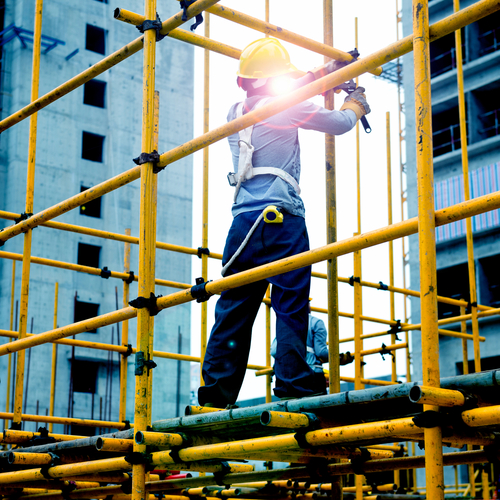Best scaffolding services in Industria, Free State
Top scaffolding services near you
Browse the best scaffolding experts and compare ratings and reviews.
Hire the best scaffolding service
Search Uptasker for the best scaffolding services
How can scaffolding services be of help to me?
Scaffolding is one of the necessities of the building and construction industry when working at heights. Scaffolding, also termed staging, can be defined as a temporary structure constructed of wooden planks and metal poles which are erected on the outside of a building, bridge or other man-made structure that is used by workmen during building, repairing, exterior plastering, painting, cleaning or maintenance of the building or structure. If you are, planning on carrying out maintenance on or painting a large structure such as a block of flats, for instance, you would require scaffolding services to be able to access all exterior parts of the building. These are the times when ladders are simply not practicable, safe, nor long enough to be of any use.
Types of scaffolding structures
Scaffolding is essentially a working platform which consists of three basic components - tubes, couplers and boards. There are two main types of scaffolding: supported scaffolds which usually have their base at ground level and are supported by rigid load-bearing elements such as poles, legs, frames and outriggers, and suspended scaffolds, which are supported by ropes or other non-rigid overhead supports. It is obvious that working platforms, especially those which are designed to allow workmen to have exterior access to buildings at some distance from the ground, must be robust and stable in order to ensure the safety of those working on these platforms. This becomes particularly vital the higher the scaffolding structure progresses. Whilst mechanical cranes, hoists, and pallet jacks can be used to haul heavy or bulky materials up to different levels, these are obviously not a suitable platform on which workers can operate, for many reasons. Scaffolding provides level surfaces and guard rails to prevent workers from falling from the platforms whilst carrying out their duties. Scaffolding is rarely totally independent of the structure which it is servicing, and framework ties are generally fixed at pre-determined points to the building itself.
Safety factors are paramount
Scaffolding must be erected according to specific safety standards and should be able to safely support both live and material loads (workmen and the materials or equipment they are working with). Scaffolds are also intended to protect those working near or under them at ground level. For this reason, barriers are erected around the base of scaffolding to ensure that pedestrians or workers at ground level do not pass directly under or within a set distance from the scaffolding construction.
No matter how carefully the work is carried out on the upper levels, there is always the possibility of falling debris or materials. Since work may be carried out simultaneously from different levels on the scaffolding platforms, safety regulations such as toe-boards, perimeter containment sheeting or overhead protective structures must be installed to prevent accidents as far as possible. Some scaffolding may be encased in protective safety mesh to provide further safety features. Workers on building and construction sites should also be wearing protective gear such as hard hats, high-visibility vests and appropriate foot- and hand-wear. Scaffolds must be easy to access in both ascent and descent, and there must be an efficient means to disposing of waste working materials from the platforms via rubbish chutes. Suspended scaffolding is commonly used by exterior window-cleaning crews when working on very tall buildings.
Alternative scaffolding forms
Scaffolding is not limited to building, construction and maintenance work as it may also be assembled for different purposes such as grandstand seating, concert stages, exhibition stands, ski ramps, and some art projects. For the home DIY enthusiast, there are various smaller baker-style scaffold platforms which are adjustable in exact small height increments and can be safely stacked up to a maximum of 3 sections high, or approximately 5.5 meters. This type of scaffolding is mounted on castors so it is very mobile and is independently height-adjustable on either side for working in difficult areas such as stairwells, sloped or on uneven surfaces.
How to find the right scaffolding service for your needs
Check their online ratings and customer reviews
Scaffolding services may be located through a number of different avenues such as the Yellow Pages, newspaper advertisements, articles and advertisements in construction and architectural magazines, and, to a lesser degree, via the web. When looking online, search sites such as Uptasker are invaluable aids. Uptasker has the added advantage of not only providing the names of suppliers and - where possible - one-click links to their web pages, but also online ratings and customer reviews, which are always the best way of checking a supplier’s reputation in the marketplace. After all, every company can provide a great sales pitch but it is the end result which is the deciding factor. Uptasker also offers the facility of comparing quotes from different suppliers so you can be sure of getting the right price.
Top scaffolding service tips

For smaller projects, there are a number of ready-made scaffolding platforms, such as baker scaffolding, which will serve the purpose perfectly well. However, when it comes to more complex jobs, you need to hire the services of a scaffolding specialist who can assess the requirements, construction and strength considerations involved and build or engineer a scaffolding structure which will ensure the safety of everyone involved. For more tips, see our scaffolding services articles.
Read Scaffolding articles